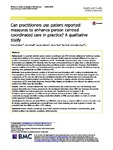Can practitioners use patient reported measures to enhance person centred coordinated care in practice? A qualitative study
| dc.contributor.author | Wheat, Hannah | |
| dc.contributor.author | Horrell, J | |
| dc.contributor.author | Valderas, JM | |
| dc.contributor.author | Close, James | |
| dc.contributor.author | Fosh, B | |
| dc.contributor.author | Lloyd, Helen | |
| dc.date.accessioned | 2018-12-04T11:16:11Z | |
| dc.date.issued | 2018-12 | |
| dc.identifier.issn | 1477-7525 | |
| dc.identifier.issn | 1477-7525 | |
| dc.identifier.other | 223 | |
| dc.identifier.uri | http://hdl.handle.net/10026.1/12976 | |
| dc.description.abstract |
BACKGROUND: To ascertain whether person centred coordinated care (P3C) is being delivered in healthcare services, components relating to the construct need to be measured. Patient reported measures (PRMs) can be used to provide a measurement of patients' experiences of P3C. Traditionally, they have been used to assess whether interventions are delivering P3C. Recently there has been an increased interest in using them to directly enhance P3C in clinical practice by, for example, improving practitioner-patient communication. However, there is limited research available on how P3C can be implemented in practice. This study aimed to extend this literature base by exploring how professionals use PRMs to enhance P3C. METHODS: Cross sectional thematic analysis of 26 semi-structured interviews with a variety of professionals who have experience of how PRMs can be used to make improvements to P3C. Inductive themes were mapped onto components of P3C care that fell under five established domains of P3C (Information and Communication; My Goals/Outcomes; Decision making; Care Planning and Transitions) to explore whether and how individual components of P3C were being improved through PRMs. Barriers and facilitators that affected the delivery and the results of the PRMs were also identified. RESULTS: Three P3C domains (Information and Communication, My Goals/Outcomes and Care Planning) were mapped frequently onto themes generated by the participants' interviews about PRM use. However, the domain 'Decision Making' was only mapped onto one theme and 'Transitions' was not mapped at all. Participant reports suggested that PRM use by practitioners enhanced patients' ability to self-manage, communicate, engage and reflect during consultations. Barriers to PRM use were related to a lack of a whole service approach to implementation. CONCLUSIONS: Practitioners use both PROMs and PREMs in various ways to improve different aspects of patient care. By sharing experiences professionals can benefit from each other's learning and work together to extend the potential value that PRMs can offer to P3C delivery. | |
| dc.format.extent | 223- | |
| dc.format.medium | Electronic | |
| dc.language | en | |
| dc.language.iso | en | |
| dc.publisher | Springer Science and Business Media LLC | |
| dc.subject | Person centred coordinated care | |
| dc.subject | Patient reported measures | |
| dc.subject | Practitioner | |
| dc.subject | Communication | |
| dc.subject | goals | |
| dc.subject | decision-making | |
| dc.subject | Care planning | |
| dc.subject | transitions | |
| dc.subject | clinical practice | |
| dc.title | Can practitioners use patient reported measures to enhance person centred coordinated care in practice? A qualitative study | |
| dc.type | journal-article | |
| dc.type | JOUR | |
| plymouth.author-url | https://hqlo.biomedcentral.com/articles/10.1186/s12955-018-1045-1 | |
| plymouth.issue | 1 | |
| plymouth.volume | 16 | |
| plymouth.publisher-url | https://www.ncbi.nlm.nih.gov/pmc/articles/PMC6278027/pdf/12955_2018_Article_1045.pdf | |
| plymouth.publication-status | Published | |
| plymouth.journal | Health and Quality of Life Outcomes | |
| dc.identifier.doi | 10.1186/s12955-018-1045-1 | |
| plymouth.organisational-group | /Plymouth | |
| plymouth.organisational-group | /Plymouth/Faculty of Health | |
| plymouth.organisational-group | /Plymouth/Faculty of Health/Peninsula Medical School | |
| plymouth.organisational-group | /Plymouth/Faculty of Health/School of Psychology | |
| plymouth.organisational-group | /Plymouth/REF 2021 Researchers by UoA | |
| plymouth.organisational-group | /Plymouth/REF 2021 Researchers by UoA/UoA04 Psychology, Psychiatry and Neuroscience | |
| plymouth.organisational-group | /Plymouth/Research Groups | |
| plymouth.organisational-group | /Plymouth/Research Groups/FoH - Community and Primary Care | |
| plymouth.organisational-group | /Plymouth/Research Groups/Institute of Health and Community | |
| plymouth.organisational-group | /Plymouth/Research Groups/Institute of Translational and Stratified Medicine (ITSMED) | |
| plymouth.organisational-group | /Plymouth/Research Groups/Institute of Translational and Stratified Medicine (ITSMED)/CCT&PS | |
| plymouth.organisational-group | /Plymouth/Research Groups/Plymouth Institute of Health and Care Research (PIHR) | |
| plymouth.organisational-group | /Plymouth/Users by role | |
| plymouth.organisational-group | /Plymouth/Users by role/Academics | |
| dc.publisher.place | England | |
| dcterms.dateAccepted | 2018-11-06 | |
| dc.identifier.eissn | 1477-7525 | |
| dc.rights.embargoperiod | Not known | |
| rioxxterms.versionofrecord | 10.1186/s12955-018-1045-1 | |
| rioxxterms.licenseref.uri | http://www.rioxx.net/licenses/all-rights-reserved | |
| rioxxterms.type | Journal Article/Review | |
| plymouth.funder | Metrics for Person Centred Care: A knowledge Portfolio, Policy and Commissioners Guide::National Health Service for England |


